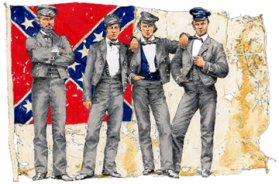Lost Causes
Here's a pretty old legacy post from the blog archives of Geekery Today; it was written about 20 years ago, in 2005, on the World Wide Web.

DiLorenzo and the LewRockwell.com Fact-Checking Team unwind after a hard day of defending free markets and individual rights against the warfare State.
Tom DiLorenzo has made a pretty steady gig for himself in lodging criticisms — mostly just ones — against the federal government’s conduct in the Civil War and against Abraham Lincoln in particular. But the tenor of his comments and his comments about similar crimes by leading lights of the Confederacy has led to some accusations that he seems to be motivated by a dishonestly-supported fetish for Dixie at least as much by concerns about the historical Lincoln. Lately he decided to prove these charges wrong, once and for all, with the following modest proposal:
re: Greatest Americans
Perhaps we should start a list of politically incorrect
greatest Americans.I’ll begin by nominating Robert E. Lee, who brilliantly led the Army of Northern Virginia in its war of secession against the empire.Virginia originally voted to stay in the union, after the lower south seceded, and re-voted (by popular vote as well as by its legislature) only after Lincoln began his invasion of the southern states. Lee turned down command of the Union Army, which was offered to him, to defend his home country against foreign invaders. He also personally liberated the slaves his wife had inherited, something Ulysses S. Grant did not get around to until he was forced to do so by the 13th Amendment in 1866.
(This should cause the politically-correct
liberventiniststo start cackling like a flock of hens).
Now, my opinions about Robert E. Lee may be different from Tom DiLorenzo’s. (If I were going to make a list of politically incorrect
greatest Virginians, I would suggest Gabriel Prosser or Nat Turner long before the pro-slavery, anti-secession, statist warrior Lee.) But whatever our differences may be, what I want to remark on here is that DiLorenzo’s description of Lee contains a documented factual error. I know about it, and he knows about it; I know that he knows about it because I wrote him about it a week ago:
To: Thomas DiLorenzo
Subject: Like a flock of hens, indeed.
Date: Mon, 20 Jun 2005In “re: Greatest Americans”, you recently claimed:
Perhaps we should start a list of politically incorrect
greatest Americans.I’ll begin by nominating Robert E. Lee, who brilliantly led the Army of Northern Virginia in its war of secession against the empire. … He also personally liberated the slaves his wife had inherited, …But this is not true. Lee’s wife did not inherit any slaves and Lee did not “liberate” them. Lee did gain temporary control over 63 slaves after the death of his father-in-law, George Washington Parke Custis, but Custis freed the slaves in his will and Lee was legally obligated to process the manumission papers within five years of his death. (You can find a copy of the will at [1].) In fact, after hiring the slaves out to other plantations for the five years he finally released the slaves in the winter of 1862 and formally filed the manumission papers on December 29, 1862 [2], five years, two months, and nineteen days after his father-in-law’s death.
To suggest that Lee deserves any credit for the emancipation when the terms of the will legally mandated it, and when he held the slaves in bondage for his own profit as long as he was legally able to do so, is either misinformation or disinformation; in either case it should not have been printed and ought to be publicly corrected.
Sincerely,
Charles Johnson
DiLorenzo didn’t mention this point in his later posts to the LRC Blog, exactly, but he did go on to prove his objectivity by explaining that Lee could not be blamed by anti-state, anti-war, pro-market
libertarians for his role in the imperial war against Mexico because doing the right thing would have been personally costly and possibly dangerous, and to suggest Jefferson Davis as the candidate for the state of Mississippi.
Still, it is important that these facts see the light of day. I wrote yesterday in praise of direct action over lobbying, and since DiLorenzo’s public correction doesn’t seem to be forthcoming, I suppose that I will have to take matters into my own hands.
Lee did not free a single one of the slaves that he gained control of after his father-in-law’s death. Custis emancipated them in his will; Lee just enacted the terms of Custis’s will, as he was legally obligated to do as its sole executor. Lee also happened to keep control over those 63 slaves for as long as he could legally get away with it and sent them, for his own profit, to be forced to work on neighboring plantations and in eastern Virginia. To credit Lee with liberating
enslaved people, when it was his father-in-law who freed them, and Lee who kept them in bondage as long as he felt that he could, is disingenuous, and the statement ought to be retracted.
Does DiLorenzo take points off for that Lee commanded a lot of conscripts?